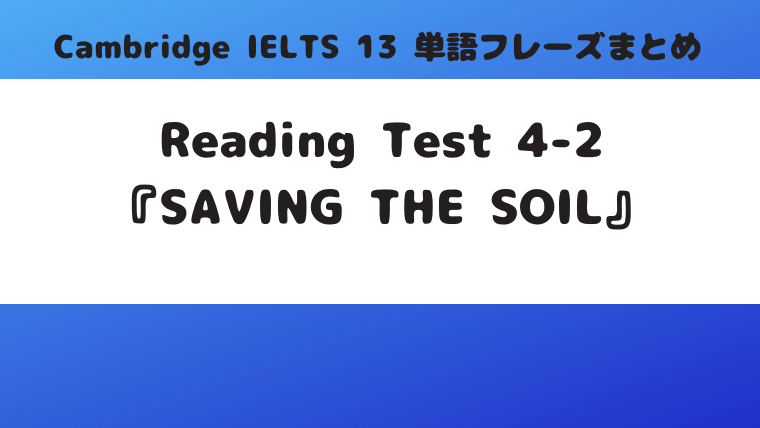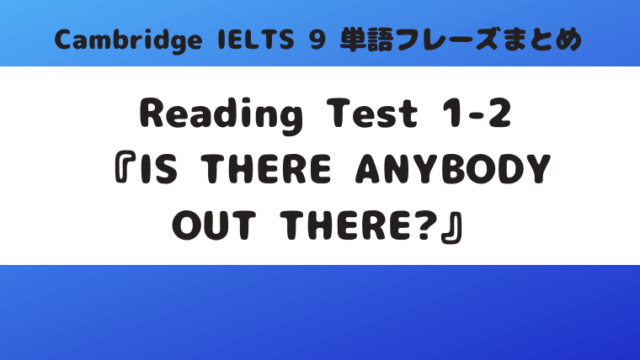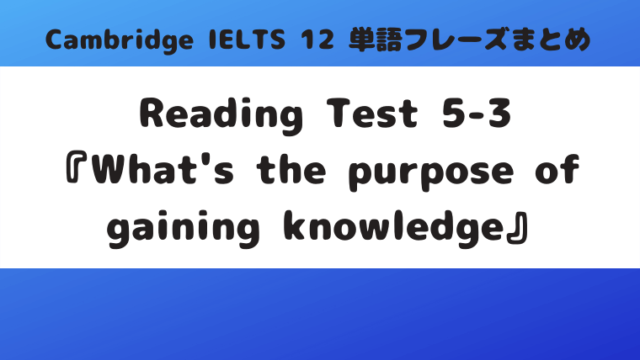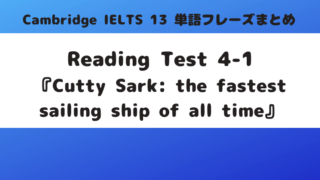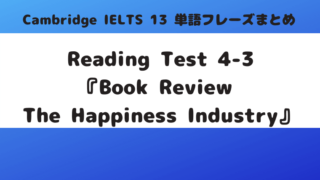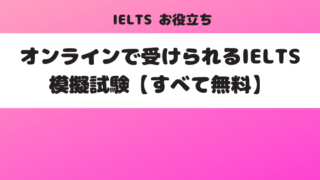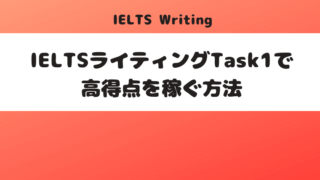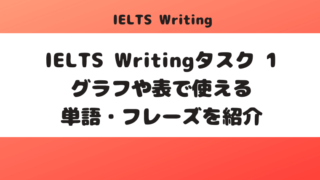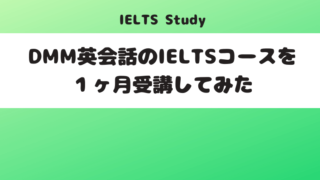「Cambridge IELTS 13」Reading Test4-2『SAVING THE SOIL』(p.85)の単語・フレーズの単語・フレーズをまとめました。
私がIELTS Readingの単語・まとめを行う理由は「Cambridge IELTS Reading単語・フレーズまとめ」からご覧ください。
Reading Test 4 Passage 2:SAVING THE SOIL
- endangered
adjective
UK /ɪnˈdeɪn.dʒəd/ US /ɪnˈdeɪn.dʒɚd/
in danger of being harmed, lost, unsuccessful, etc.:
<動植物が> 絶滅の危機に瀕(ひん) した
(実践IELTS英単語3500:2429) - flammable
adjective
UK /ˈflæm.ə.bəl/ US /ˈflæm.ə.bəl/
Something that is flammable burns easily:
可燃性の, 引火性の
同意 inflammable 反意 nonflammable - microorganism
noun [ C ] BIOLOGY
UK /ˌmaɪ.krəʊˈɔː.ɡən.ɪ.zəm/ US /ˌmaɪ.kroʊˈɔːr.ɡən.ɪ.zəm/
a living thing that on its own is too small to be seen without a microscope
微生物 - virus
noun [ C ]
UK /ˈvaɪə.rəs/ US /ˈvaɪ.rəs/
・an extremely small piece of organic material that causes disease in humans, animals, and plants:
・a disease caused by a virus:
・a computer program or part of a computer program that can make copies of itself and is intended to prevent the computer from working normally
1 ウイルス
→ bacteria
2 (ˈvirus inˌfection とも) ウイルス性疾患
3 (コンピュータ)ウイルス
(実践IELTS英単語3500:1631) - fungi (fungusの複数形)
noun [ C or U ]
UK /ˈfʌŋ.ɡəs/ US /ˈfʌŋ.ɡəs/
plural fungi UK /ˈfʌŋ.ɡaɪ/ US /ˈfʌŋ.ɡaɪ/ funguses
any of various types of organisms that get their food from decaying material or other living things:
《C, U》 菌類 ((きのこ,かびなど)) - amid
preposition formal
UK /əˈmɪd/ US /əˈmɪd/
in the middle of or surrounded by:
1 …のさなかに, …の中で
2 〘文〙 …の真ん中に, …に囲まれて - decompose
verb [ I or T ]
UK /ˌdiː.kəmˈpəʊz/ US /ˌdiː.kəmˈpoʊz/
to decay, or to cause something to decay:
to break, or to break something, into smaller parts:
1 a) 《自》 <死体・ごみなどが> 腐敗する, 腐る
同意 rot
2 a) 《自》 〘専門〙 分解する
同意 break down
b) 《他》 〘専門〙 …を分解する
同意 break down
(実践IELTS英単語3500:3366) - antibiotic
noun [ C ]
UK /ˌæn.ti.baɪˈɒt.ɪk/ US /ˌæn.t̬i.baɪˈɑː.t̬ɪk/
a medicine or chemical that can destroy harmful bacteria in the body or limit their growth:
抗生物質
(実践IELTS英単語3500:2821) - ally
noun [ C ]
UK /ˈæl.aɪ/ US /ˈæl.aɪ/
・a country that has agreed officially to give help and support to another one, especially during a war:
・someone who helps and supports someone else:
1 同盟国, 連合国
→ Allies
2 盟友, 支持者
3 強い味方(となるもの), 役に立つもの - digest
verb
UK /daɪˈdʒest/ US /daɪˈdʒest/
to change food in your stomach into substances that your body can use:
to read or hear new information and take the necessary time to understand it:
1 a) 《他》 <食べ物> を消化する
b) 《自》 <食べ物が> 消化する
2 《他》 <情報・知らせなど> (の意味)を理解する
(実践IELTS英単語3500:1361) - decay
verb
UK /dɪˈkeɪ/ US /dɪˈkeɪ/
・to become gradually damaged, worse, or less; to cause something to do this:
・If a radioactive substance decays, it changes to a different form, producing radiation:
1 a) 《自》 <食べ物・死体などが> 腐る, 腐敗する, <木が> 朽ちる, <歯が> 虫歯になる
同意 rot
b) 《他》 …を腐らせる, <木を> 朽ちさせる, <歯> を虫歯にする
同意 rot
2 《自》 <町などが> 荒廃する, <建物などが> 老朽化する
3 《自》 <社会・産業などが> 衰退する, <価値観・規範などが> 影響力をなくす
同意 decline
(実践IELTS英単語3500:1237) - ammonium
noun [ U ] CHEMISTRY specialized
UK /əˈməʊ.ni.əm/ US /əˈmoʊ.ni.əm/
a type of ion that is derived from ammonia and is contained in chemical compounds of it:
アンモニウムイオン[塩] - nitrate
noun [ C or U ]
UK /ˈnaɪ.treɪt/ US /ˈnaɪ.treɪt/
a chemical that includes nitrogen and oxygen, often used as a fertilizer (= a substance that helps plants grow):
硝酸塩[エステル] - pollute
verb [ T ]
UK /pəˈluːt/ US /pəˈluːt/
to make an area or substance, usually air, water, or soil, dirty or harmful to people, animals, and plants, especially by adding harmful chemicals:
1 <空気・水など> を汚染する
2 …をだめにする, 台なしにする
同意 ruin, spoil
3 <人> を堕落させる
同意 corrupt
(実践IELTS英単語3500:2469) - nitrous oxide
noun [ U ] CHEMISTRY specialized
UK /ˌnaɪ.trəs ˈɒk.saɪd/ US /ˌnaɪ.trəs ˈɑːk.saɪd/
a type of gas with a sweet smell that is used as a weak anaesthetic (= substance that stops pain), especially by dentists
亜酸化窒素 ((歯科用麻酔剤)) 同意 laughing gas - indiscriminate
adjective
UK /ˌɪn.dɪˈskrɪm.ɪ.nət/ US /ˌɪn.dɪˈskrɪm.ə.nət/
not showing careful choice or planning, especially so that harm results:
1 <攻撃・殺人・暴行などが> 無差別の, 手当たり次第の
2 <人が> 見境のない, 思慮に欠けた - acidic
adjective
UK /əˈsɪd.ɪk/ US /əˈsɪd.ɪk/
containing acid:
very sour:
1 酸性の
2 すっぱい, 酸味のある - nourish
verb [ T ]
UK /ˈnʌr.ɪʃ/ US /ˈnɝː.ɪʃ/
・to provide people or living things with food in order to make them grow and keep them healthy:
・If you nourish a feeling, belief, or plan, you think about it a lot and encourage it:
1 <人・動植物> に栄養を与える
2 〘文〙 <感情・考え・信念など> をはぐくむ, 強固にする
(実践IELTS英単語3500:2481) - fertilizer
noun [ C or U ] (UK usually fertiliser)
UK /ˈfɜː.tɪ.laɪ.zər/ US /ˈfɝː.t̬əl.aɪ.zɚ/
a natural or chemical substance that is spread on the land or given to plants, to make plants grow well:
肥料 - overuse
verb [ T ]
UK /ˌəʊ.vəˈjuːz/ US /ˌoʊ.vɚˈjuːz/
・to use something too often or too much:
・the fact that something is used too often or too much:
…を使いすぎる, 乱用する, 酷使する - dirt
noun [ U ]
UK /dɜːt/ US /dɝːt/
・dust, soil, or any substance that makes a surface not clean:
・soil on the ground:
・solid waste:
1 米 〘英ではまれ〙 土, 土壌
2 (泥・ほこりなどの) 汚れ
3 〘インフォーマル〙 ゴシップ, スキャンダル
4 米 猥談(わいだん), ポルノ
同意 filth
5 〘インフォーマル〙 (犬の) 糞(ふん)
(実践IELTS英単語3500:818) - degradation
noun [ U ]
UK /ˌdeɡ.rəˈdeɪ.ʃən/ US /ˌdeɡ.rəˈdeɪ.ʃən/
the process in which the beauty or quality of something is destroyed or spoiled:
1 《C, U》 屈辱, 不名誉
2 《U》 悪化, 劣化, 低下
3 《U》 〘専門〙 (化合物の) 分解 - unify
verb [ T ]
UK /ˈjuː.nɪ.faɪ/ US /ˈjuː.nə.faɪ/
to bring together; combine:
1 a) 《他》 …を統一する, 結合する b) 《自》 一つになる, 一体化する
2 《他》 <異なる考え・システムなど> を組み合わせる, 一様にする
(実践IELTS英単語3500:2453) - field survey
実地踏査 - drone
noun
UK /drəʊn/ US /droʊn/
・a low continuous noise that does not change its note:
・an aircraft that does not have a pilot but is controlled by someone on the ground, used especially for dropping bombs or for surveillance (= careful watching of a place):
・an aircraft without a pilot that is controlled by someone on the ground, used especially as a hobby
・a male bee
1 《常に単数形で》 ブーンとうなる音, 持続低音
2 《C》 (針がなくて働かない) 雄ミツバチ
3 《C》 (安い報酬で) 単調な仕事を続ける人
4 《C》 〘専門〙 (無線操作の) 無人機, 無人飛行機
5 《C》 怠け者, のらくら者 - map
verb [ T ]
UK /mæp/ US /mæp/
to represent an area of land in the form of a map:
1 <ある地域> の地図を作る
2 …の位置関係[働き]を見つける[示す]
3 米 …の計画を練る
同意 map out
4 〘専門〙 <遺伝子> の染色体上の位置を決定する, をマッピングする, <遺伝情報> の配列を解析する - depth
noun
UK /depθ/ US /depθ/
・the distance down either from the top of something to the bottom, or to a distance below the top surface of something:
・the lowest part of the sea:
・the state of having serious qualities or the ability to think seriously about something:
・in a serious and detailed way:
the distance from the front to the back of something:
the fact of a feeling, state, or characteristic being strong, extreme, or detailed:
・in the depth(s) of sth
experiencing an extreme and negative emotion:
during the worst period of a bad situation:
・the quality of having a low sound:
・the fact of something, especially a colour, having the quality of being dark and strong:
1 《C, U》 (海・川・穴などの) 深さ, 深度
2 《C, U》 (戸棚・引き出しなどの) 奥行き
3 the depth of something <感情>の深さ, 強さ
4 the depth of something <問題・危機など>の重大さ, 深刻さ
5 《U》 (知識・理解力などの) 深さ, 深み, 豊富さ
6 《C, U》 (芸術・人などの) 奥深さ, 深み
7 the depths 《常に複数形で》 〘文〙 深海
8 the depths of the forest / earth / countryside
森[地球,田舎]の奥地
9 《U》 (チームなどの) 層の厚さ, (人材の) 豊富さ
10 《U》 (色・風味などの) 濃さ, 深さ, (音などの) 低さ, 太さ
(実践IELTS英単語3500:410) - freely
adverb
UK /ˈfriː.li/ US /ˈfriː.li/
without being controlled or limited:
in a way that is not fixed or joined to anything, so able to move easily:
1 (制約などがなく) 自由に, じゃまされずに
2 (動きなどについて) 自由に, スムーズに
3 包み隠さず, 正直に
4 進んで, 気前よく
5 (翻訳について) 意訳で - neutrality
noun [ U ]
UK /njuːˈtræl.ə.ti/ US /nuːˈtræl.ə.t̬i/
a neutral position, especially in a war:
1 (論争などにおける) 中立, 不偏不党
2 (政治・軍事的な) 中立
(実践IELTS英単語3500:1137) - on the brink
寸前で - agitate
verb
UK /ˈædʒ.ɪ.teɪt/ US /ˈædʒ.ə.teɪt/
・to make someone feel worried or angry:
to argue forcefully, especially in public, in order to achieve a particular type of change:
to shake a liquid:
1 《自》 扇動する, 世論に訴える
2 《他》 〘フォーマル〙 <人> を動揺させる, 不安にさせる
3 《他》 〘専門〙 <液体> をかき混ぜる
(実践IELTS英単語3500:2988) - conserve
verb [ T ]
UK /kənˈsɜːv/ US /kənˈsɝːv/
to keep and protect something from damage, change, or waste:
1 <自然・環境など> を保護する, 保全する
2 <資源・エネルギーなど> を節約して使う, 温存する
(実践IELTS英単語3500:2343) - unspoiled
adjective
UK /ʌnˈspɔɪld/ /ʌnˈspɔɪlt/ US /ʌnˈspɔɪld/ /ʌnˈspɔɪlt/
An unspoiled place is beautiful because it has not been changed or damaged by people:
1 <場所が> 荒らされていない, 手つかずの
2 <人が> 変わっていない, 昔のままの - benchmark
noun [ C ]
UK /ˈbentʃ.mɑːk/ US /ˈbentʃ.mɑːrk/
a level of quality that can be used as a standard when comparing other things:
1 (判断・評価などの) 基準, 尺度
2 (測量の) 水準点
3 ベンチマーク ((コンピュータシステムやプログラムなどの性能評価基準))
(実践IELTS英単語3500:3103)
